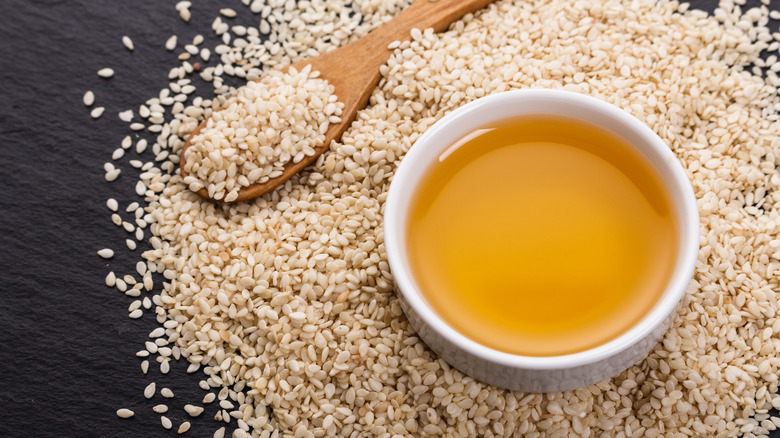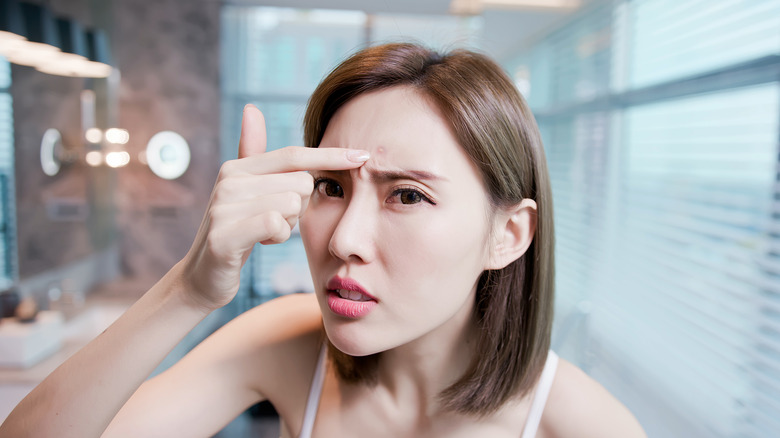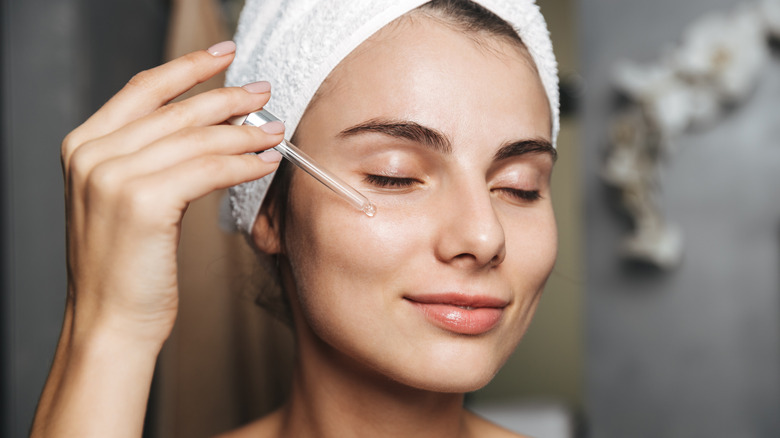How Sesame Oil Can Benefit Your Skin
Sesame oil has been used in Asian cuisine for centuries, but did you know that it's also good for your skin? Plant oils, such as argan, jojoba, avocado, and sesame oil, fight inflammation and help repair damaged tissues. Moreover, they strengthen the skin's protective barrier and promote wound healing, according to research published in the International Journal of Molecular Sciences.
What makes sesame oil stand out is its high content of vitamin K and unsaturated fats. One tablespoon provides 120 calories, 5.3 grams of monounsaturated fats, 5.6 grams of polyunsaturated fats, and large doses of antioxidants. It also delivers 2% of the recommended daily intake of vitamin K, reports My Food Data. Due to its exceptional nutritional value, it might be just as good for your heart as olive oil (per the International Journal of Food Medicine). Plus, it boasts an intense flavor that can complement a wide range of dishes, from salads and stir-fries to sauces and marinades.
So, how does sesame oil benefit your skin? And what's the best way to reap its benefits?
Fight skin inflammation and acne-causing bacteria
The antioxidants and anti-inflammatory compounds in sesame oil promote skin health. For example, a 2018 review published in the International Journal of Molecular Sciences suggests that sesame oil may protect the skin from UV radiation when used topically. Moreover, it speeds up wound healing and slows the aging process. Some studies indicate that it may also lower the risk of skin cancer, notes the review. Scientists attribute these potential benefits to its high content of poly- and monounsaturated fatty acids, polyphenols, and other bioactive compounds, such as sesamol.
Sesame oil may also help with acne due to its anti-inflammatory and antimicrobial effects, cosmetic dermatologist Rinky Kapoor told Health Shots). She recommends using it as a natural remedy for pimples, whiteheads, and blackheads. On top of that, it helps repair damaged skin cells and may improve your complexion.
"You can apply pure sesame oil directly on the skin in a small quantity or mix it with your skin products to get the maximum benefits out of it," suggests Dr. Kapoor. If you have acne, apply a small amount to the affected area and leave it overnight. You may also use it as a natural alternative to sunscreen. Simply apply it to your skin about 30 minutes before sun exposure.
Sesame oil may slow down aging
As mentioned above, sesame oil improves the skin's protective barrier and protects against oxidative damage and reduces the harmful effects of UV radiation — both of which accelerate the aging of the skin. According to the International Journal of Molecular Sciences, over time, reactive oxygen species (ROS) accumulate in the skin and other organs, affecting the epidermal and dermal skin layers. Sunlight exposure further increases ROS production and speeds up aging, explains a 2015 review featured in the journal Biomolecules.
Plant oils, including sesame oil, promote tissue repair and scavenge free radicals. As a result, they may help reduce the signs of aging and improve skin appearance. Clinical evidence published in Pharmacognosy Review suggests that sesame oil blocks out about one-third of UV ray. Olive and coconut oil, by comparison, only block 20% of UV rays. What's more, sesame oil is rich in tocopherols, a group of phenolic compounds that make up vitamin E. These antioxidants reduce photodamage and skin roughness while minimizing the appearance of wrinkles and fine lines.
Now that you know how sesame oil can benefit your skin, go ahead and give it a try. First, apply a few drops to your wrist or elbow and leave it for a few hours. If you don't experience any allergic reactions, apply the oil to your face, neck, and other areas. You can also massage it into your scalp and hair to fight dryness. Use it alone or mix it with your favorite conditioner to reap the benefits.


